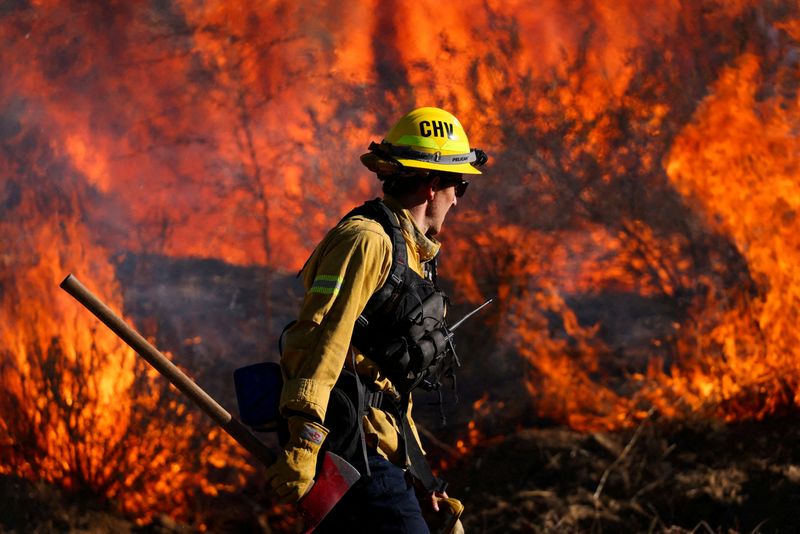
© Reuters. FILE PHOTO: A firefighter works to extinguish the Highland Fire, a wind driven wildfire near Aguanga, California, U.S., October 31, 2023. REUTERS/Mike Blake/File Photo
2/2
(This story has been corrected to fix the attribution from GRAPHIC to ANALYSIS)
By Mark John
(Reuters) – Ahead of international climate talks in Dubai this month, economists are updating estimates of the impact of global warming on the world economy, sometimes calculating down to a decimal place the hit to output in decades to come.
But detractors say those numbers are the product of economic models that are not fit to capture the full extent of climate damage. As such, they can provide an alibi for policy inaction.
Record temperatures, droughts, floods and wildfires this year have caused billions of dollars of damage, even before emissions take warming beyond the 2015 Paris Agreement cap of 2 degrees Celsius (3.6 Fahrenheit) above pre-industrial levels.
Still, some economist models conclude – implausibly, say the critics – that by the turn of the century, warming will cause less harm to the world economy than COVID-19 has, or hit global shares by less than in the 2007-2009 financial crisis.
Nobel-winning U.S. economist William Nordhaus sparked controversy in 2018 with a model that found the climate policies that best balanced the costs and benefits from an economic point of view would result in warming of more than 3C by 2100.
A year earlier, the Trump administration cited similar models to justify replacing the Obama-era Clean Power Plan with one allowing higher emissions from coal-burning plants.
Many policymakers acknowledge the modelling’s limitations: European Central Bank executive board member Isabel Schnabel said in September it could understate the impact. Others go further, saying the whole approach is flawed.
At issue are the “integrated assessment models” (IAMs) economists use to draw conclusions on anything from output losses to financial risk or the pricing of carbon markets.
They rely on a theory of how demand, supply and prices interact throughout an economy to find a new balance after an outside shock – the so-called “general equilibrium” model developed by 19th century French economist Leon Walras.
“But climate change is fundamentally different to other shocks because once it has hit, it doesn’t go away,” said Thierry Philipponnat, author of a report by Finance Watch, a Brussels-based public interest NGO on financial issues.
“And if the fundamental assumption is flawed, all the rest makes little sense – if any,” he told Reuters.
Another issue is that IAMs have for years used a “quadratic function” to calculate GDP losses that involves squaring the temperature change – while ignoring other methods such as the exponential function better suited for rapid change.
Critics say this choice is doomed to underplay the likely impact – particularly if the planet hits environmental tipping points in which damage is not only irreversible but happens at an ever-accelerating rate.
THE SMELL TEST
Adding to the confusion, IAMs produce sharply different results according to their specific design and the variables they choose to include, making interpretation difficult.
The 2023 update of Nordhaus’ model, described on his website as the “most widely used climate-change IAM”, estimates damages of 3.1% of global GDP when 3C warming is reached.
By contrast, the latest run of the model used by the Network for Greening the Financial System (NGFS) – a grouping of central banks – calculates the path to 2.9C of warming in its “current policies” scenario would by 2050 have caused 8% of lost output from hazards such as drought, heatwaves, floods and cyclones.
Finance Watch also pointed to a 2020 study by the G20-backed Financial Stability Board (FSB) that cited economist estimates that 4C of warming could shave as little as 2.9% off the average value of global financial assets by the year 2105.
“None of the assumptions that this relatively small group of economists have made about global warming ‘pass the smell test’,” University College of London professor Steve Keen wrote in a paper this year of the need for economists to check their results against common sense and prevailing climate science.
Nordhaus did not reply to an emailed request for comment.
The FSB said its 2020 paper highlighted how much estimates of the hit to financial assets varied and that it was working with others to help authorities better understand the risks.
“To that end, the FSB has been working on the development of conceptual frameworks and metrics for monitoring climate-related vulnerabilities,” FSB Deputy Secretary General Rupert Thorne said in an emailed statement.
Livio Stracca, the ECB official who chairs the NGFS work on climate scenarios said by email that it openly accepted that, like any model, they had “certain limitations”. NGFS Secretary General Jean Boissinot said the body was keen to work with the academic community to resolve the issues.
But while advocates of IAMs say they are getting better all the time, others such as Nicholas Stern of the LSE/Grantham Research Institute said their focus was inherently too narrow to make sense of the extreme risks posed by climate change.
“They misrepresent the problem in terms of risk and in terms of what we need to know and do,” Stern told Reuters.
“We’ll need to look at energy models, cities, natural capital – and that is serious, deep economics around structural change,” he said, adding this method would better guide the investment decisions needed to address climate change.
Finance Watch’s Philipponnat said the European Union, which sees itself as a leader on climate issues, would have a chance to embrace a broader approach with a major study on climate risks it has scheduled for early 2025.
“Our main message is: ‘Economists, speak to climate scientists and come up with results that make sense’,” he said.
(Writing and reporting by Mark John; editing by Barbara Lewis)
